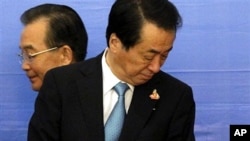Leaders of Southeast Asia and their neighbors are meeting in Hanoi to discuss economic and political cooperation. Tensions surfaced between China and Japan with Beijing accusing Tokyo of spoiling hope for talks between their leaders.
Leaders of the Association of Southeast Asian Nations held talks Friday with Japan, South Korea, and China before meeting with United Nations Secretary-General Ban Ki-moon.
The ASEAN Secretary General Surin Pitsuwan told journalists the leaders of ASEAN and the three countries emphasized the growing importance of their group, known as the ASEAN plus three.
"And, they would like to intensify their cooperation and the integration in trade and investment and development and various other areas to make sure that this region is a region of growth and stability and progress," he said.
Harsh words
But, just as the meetings ended, China lashed out at Japan, rejecting talks between the Chinese Premier and the Japanese Prime Minister.
China's official Xinhua news agency quoted Assistant Foreign Minister Hu Zhengyue as accusing the Japanese of ruining the atmosphere for discussions by making untrue statements in earlier meetings.
Xinhua said the Chinese delegation rejected reports that the two sides agreed to resume negotiations on territorial disputes in the East China Sea.
Tokyo's response
A Japanese government spokesman, Noriyuki Shikata, told journalists there was no basis for such a reaction.
"We think we should engage in dialogue between the two countries. And, there are issues to be resolved," Shikata said. "And, we maintain our basic position that in order to resolve issues, pending issues, we have to talk."
The Foreign Ministers of China and Japan met Friday morning in what appeared to be a sign of warming relations.
What led to tensions?
Tensions have been high between the Asian giants since the Japanese navy detained a Chinese fishing boat in disputed waters.
Industry insiders say Beijing responded by banning exports of rare minerals to Japan, a charge that China denies.
During the three-day ASEAN summit concerns have been raised about China's increasingly assertive claims on maritime territories.
Beijing claims the entire South China Sea, putting it in conflict over the Paracel and Spratly islands with Brunei, Malaysia, the Philippines, Taiwan and Vietnam.
Burma elections
Surin says the United Nations Secretary-General Ban Ki-moon also raised the issue of controversial election plans in Burma, also known as Myanmar.
"The U.N. Secretary-General said post elections is as important as pre-elections," Surin said. "Myanmar should send a right signal to the world that the world would be able to respond in order to solve a lot of problems that people of Myanmar would like to see resolved."
Burma's military government is to hold the country's first elections in two decades on November 7.
Critics have dismissed the elections as a sham.
The military is already guaranteed a quarter of all seats in parliament, has sidelined opposition parties, and banned outside observers and journalists.
Member countries
The ASEAN's members are Brunei, Burma, Cambodia, Indonesia, Laos, Malaysia, the Philippines, Singapore, Thailand, and Vietnam.
They will be joined Saturday by heads of state from Australia, India, and New Zealand for the East Asia Summit.
Russia and the United States will attend the East Asia Summit as observers and be invited to join as members in 2011.
ASEAN Summit: China, Japan Tensions Dash Hopes for Talks




